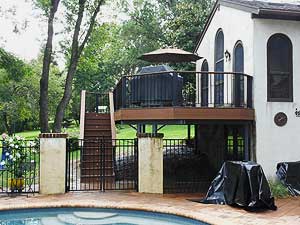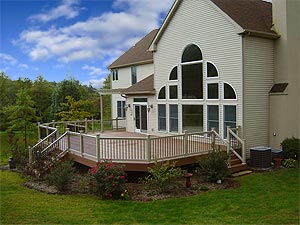What You Need To Know To Build Your Own Custom Deck
 Recent code revisions for Berks County Pennsylvania mean you must give especially serious consideration to the lateral load support of any deck added to your home. Your deck project will need to account for variables such as load balance, stability, lift, and more. This page and the additional resources provided will help you navigate through these important stages of your planning.
Recent code revisions for Berks County Pennsylvania mean you must give especially serious consideration to the lateral load support of any deck added to your home. Your deck project will need to account for variables such as load balance, stability, lift, and more. This page and the additional resources provided will help you navigate through these important stages of your planning.
When you are considering a do it yourself deck building project, it may seem at first to be just poles, frame, decking, and railing. Then comes the reality jolt, and now we may even be delivering it as you read this. But safety is not to be reckoned with. Even at ground level, an improperly structured deck can be dangerous.
Always ask yourself the “what if?” questions and plan for the worst.
 What if a group of parents suddenly rush to one side of the deck to watch the kids compete in a water balloon fight?
What if a group of parents suddenly rush to one side of the deck to watch the kids compete in a water balloon fight?- What if cousin Joe cranks up Chubby Checker and 30 guests decide to do an impromptu “Twist” on the deck?
- What if that nearby hill sends excess water to an undesired location in heavy rain and/or floods the area where you have the footings?
- What if your basement floods from leaks caused by the attachment you bolted to your home's fascia to secure the deck?
To be honest, many homeowners end up hiring a professional deck builder once they discover what they are truly up against building their own deck. Even if you come to this same conclusion, you'll still greatly benefit from this resource page for one primary reason. The fact is, not all contractors are honest, but you already know that. This page will help you spot the frauds and be more confident in choosing a reputable contractor.
Deck Building Essentials
The first step is deciding which decking material you want to use. See our Materials Comparison page to help you decide.
Next, consider the options available to you. What type of terrain does your yard have? Which deck styles will lend themselves to your situation? To help with this stage of your planning, here are some resources:
- TimberTech, a leading manufacturer of composite decking has a useful Deck Designer tool to help you configure and visualize decking options. Be sure to check out some of the other Multimedia Resources there too for ideas and inspiration.
- Backyards and Gardens is a treasure trove of ideas not just for decks, but pretty much anything backyard and outdoor living space.
- Deck Advisor has real pros contributing valuable information that will help you in planning and building your backyard dream deck.
- Professional Deck Builder magazine provides insights on the latest advances, trends, and other useful information that the pros use. Because this is a trade magazine, it gets a bit technical at times, but it's a valuable resource as you proceed toward the task of building your own deck.
After this stage, you will either be calling some contractors to discuss your deck project or you will bravely advance forward toward planning a deck you feel confident enough to build yourself. While planning, the #1 priority you want to keep in mind is safety. The North American Deck and Railing Association (NADRA) is the go to authority on everything decks, and the resources available through their Deck Safety Program are an absolute must in planning and maintaining your deck.
With a name like decks.com, you would expect the site to have about everything you need concerning decks, and you would be right. You'll want to be sure to get their free Deck Construction Guide and check out the Free Plans among other things.
 Once you've reached this point, be sure to visit your local Berks County permit authority for the town you live in and obtain the proper permits. This will also involve checking to be sure your plans meet code requirements. These codes may seem like an added nuisance, but they not only improve safety, you want to be sure you are not compromising the integrity of your home if the deck is attached.
Once you've reached this point, be sure to visit your local Berks County permit authority for the town you live in and obtain the proper permits. This will also involve checking to be sure your plans meet code requirements. These codes may seem like an added nuisance, but they not only improve safety, you want to be sure you are not compromising the integrity of your home if the deck is attached.
As a side note, do it yourself decks that are attached to your home and not free-standing have some additional considerations, due to flashing and proper deck-to-house connections. Consider using a “free standing” design instead (that doesn't mean it doesn't look like it's attached, it's just not physically bolted to your home). Or, carefully research the flashing and bolting details required by code before attempting an attached deck.
